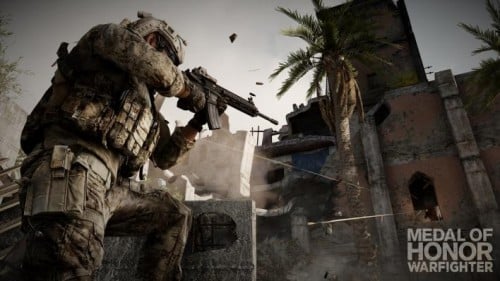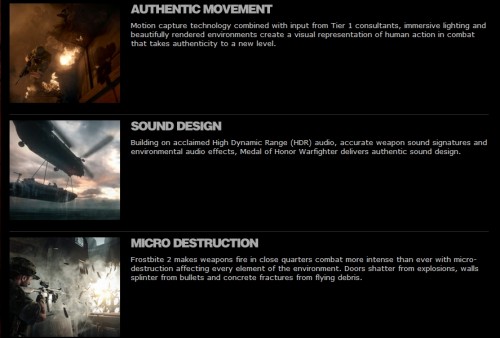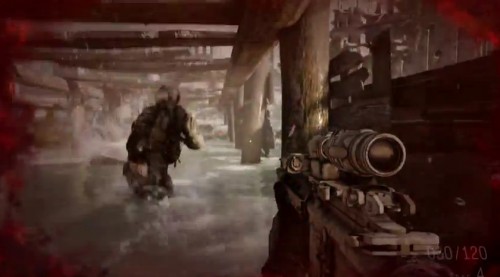Image courtesy of EA, Medal of Honor
The other day a friend showed me an article on GameSpot that made me perk up a bit; they published an article on Friday called “When did regenerating health become realistic”. As an avid fan of First Person Shooters, and a veteran of two Iraq tours myself, I have to say that Tom Mc Shea is quite off the mark on this one.
In the article, Tom pretty much slams Medal of Honor’s latest title “Warfighter” as disrespectful to soldiers and for not being as “realistic” as claimed. I like Mc Shea’s articles, and I especially like GameSpot for their extensive coverage of the video game industry. But I have to say that I found it almost comical to see the extent Mc Shea staked his claim against Medal of Honor: Warfighter and realism.
By focusing on instant satisfaction and extreme accessibility, they turn real battles into a virtual fantasyland where no harm is lasting and no danger exists.
First and foremost, this is a game; like others in this genre, it is designed and marketed as entertainment. If you asked me to define realism in a game, I would say it applies to sounds, graphics, weapons, and environment.
The argument he claims about the regeneration of life and soldier camaraderie was one I found to be almost upsetting. I think that there is definitely a reason to argue the authenticity of the game itself, but only to a certain degree of whether or not it is “just another” FPS like all the rest, but in no way does it disrespect soldiers. If a game company makes promises, then by all means they should be held to them. But keeping promises in context and not taking the game too far is where the line MUST be drawn.
Authenticity
One of the biggest arguments of the article is the fact that Warfighter is not as realistic or authentic as Medal of Honor claims it to be. I don’t really want to get into all the graphic details of how you could really make things more authentic when it relates to war, but let’s again remember why someone shells out $60 for a video game.
Here is a statement from the article that I found interesting:
There is a severe disconnect in military shooters between the painstakingly lifelike weapons, environments, and all of the army-approved ancillary details and the actual combat. While I was watching Warfighter, one player was shot multiple times in the back by an enemy attacker, quickly turned around to face his assailant, and struck him dead with a few well-placed shots to the head.
There is indeed a severe disconnect in military shooters and real life, and for good reason. Until Gerard Butler finds himself with nanites injected into his brain (Gamer Movie), we won’t be controlling humans in real life tactical situations any time soon, if ever at all. I do however agree with Tom in regards to weapons, damage, and some environmental things that could certainly be improved or made more realistic (that’s a valid argument). I can tell you as a fact that people don’t want to get into actual horrors of war, and if they really do then they have no idea what that concept really means.
I am talking about the parts of war that you simply cannot even begin to contemplate until you find yourself smack dab in the middle of one — when you start flashing back on random key points in your life — at the point you have to entertain the notion of whether or not these will be the last thoughts you’ll have on this earth.
No one actually buys a video game for that level of reality; they raise their right hand and swear an oath instead.
I don’t think anyone pre-ordering Medal of Honor or Call of Duty hopes that they’ll actually experience the horrors of war on their big screen. There is no way to realistically replicate calling in the 9 line medevac since their patrol just got hit by an IED or a sniper managed to place a bullet just above the neck guard on their turret gunner’s vest. People don’t want to know what it’s really like to hook up and rip the door off a of a burning HMMWV (Hum-Vee) so they can get the soldiers out; they just don’t. If you really want to experience any of this stuff in a MARGINALLY realistic fashion, then I suggest checking out some of the better made movies instead of playing a video game.
Image courtesy of EA, Medal of Honor
Regeneration and Respawn
Kneeling behind a pillar, the victorious player’s screen slowly shifted from a red-streaked mess to a clear view as he returned to full health. Fully healed, he marched off to find another player to kill. Obviously, Warfighter is hardly the first military shooter that portrays war in this manner, and it won’t be the last, and that trend is scary.
So let’s be clear on health regeneration and the ability to be healed or find packs to heal yourself. I assume by this he is meaning that without any help of a medic or a field pack, that you will just return to 100% after a given amount of time. I’ll agree completely that this type of health regeneration is not very realistic. Let’s not get confused though; if I am injured to the point where I am struggling to breathe, have multiple wounds, and am basically fertilizing the grass with my blood, then you can be sure that running over a random med pack on the ground is not going to heal me up. Furthermore, even if a medic got to me before I died, he would only be able to stabilize me for long enough to get the chopper there to pick me up (hopefully). Imagine having a casualty collection point, calling in the bird, securing the area, and waiting for the extraction in a video game. Actually, that sounds actually pretty cool to me, but it’s probably not something the average player would care to see in a video game.
In combat, we wear a ballistic helmet, plated vest, and we have a first aid kit attached to our gear at all times. This is all great for prevention, but as you all well know it does not mean it will save your life; it only means that it could save your life. Knowing we had some of the best trained field medics in the world with us is was also quite a relief. When something happens in combat, it’s not likely that you will be getting patched up and put back into battle within a few seconds, minutes, or even hours.
I can’t honestly figure out a better way for games to deal with health than having a reviving medic and/or med kits that will heal you on the spot. Who really wants to wait hours, days, or even on some cases until the next map launches? If you do happen to die in these games, the only loss you actually have to accept is your death counter going up and waiting a few seconds before you respawn. I think that is a better alternative to the real thing, and it in no way “disrespects” soldiers. Oh yeah, did I mention we are still talking about a video game.
Image courtesy of EA, Medal of Honor
Buddy Teams
One of the “innovative” features in Warfighter is the ability to team up with another character so that you can always see an outline of them, even when they’re offscreen, and appear behind them when you respawn. This showcases the camaraderie that soldiers develop on the battlefield but also highlights how poorly death is handled. Infinite lives are the norm in military shooters. If you get lackadaisical on the battlefield and find a knife lodged in your back, you reappear moments later at full health, as if nothing bad had happened.
In the military, one of the first and last things you are taught is that you must rely on others, or even more so your “battle buddy.” This person becomes your brother or sister in arms, pretty much like your shadow. You do nothing alone, only in pairs at minimum, and you can plan on having them attached to your hip. This person is almost an extension of you, and from the sounds of it the game tries to highlight that point with this feature of teaming up. If that person were to die in real life, it obviously would be catastrophic; whether they were your battle buddy or not. Mc Shea makes the comment on how poorly death is handled with this approach. Let’s remember again, this is a video game. Do you really want gamers — kids, people looking for entertainment — to live through the real deal? Do you want to call Mortuary Affairs to come out and collect remains, personal effects, and start a chain of custody? Do you want to schedule the trip back to the states and assign the guard detail and Chaplin for the service? Absolutely not! That clearly is not the nature of the game, nor should it ever be. The fun of a video game is that you respawn, regenerate, and continue playing.
Summary
I don’t normally get vocal when it comes to military shooters, but I really felt the need to vent here. I want to state again that I respect everyone’s right to voice their opinion, and of course what I wrote here is completely my personal opinion and does not reflect the thoughts and feelings of anyone else or other soldiers.
One of the biggest dangers soldiers face in wartime is boredom and complacency. In order to beat this enemy, soldiers must learn to stay occupied and keep busy. Probably one of the number one ways to do this is to play video games. Of all the games played by soldiers overseas, I feel confident in speaking from personal experience that 50% of the games played are sports, and the other 50% are First Person Shooter games like Medal of Honor, Call of Duty, and Battlefield.
As a soldier who loves playing these games, I honestly just don’t see where some of the statements of that article hold much water. I do agree that if a company boasts about realism, that they should in fact back up their claim and make the game as real as possible — but that is only possible to a certain degree! It’s supposed to be entertainment, and that’s what it is advertised, sold and marketed as.
I will be buying this game and probably more just like it; mostly because I like these types of games. But does it make it less realistic that I am not bothered by the fact that I won’t cry myself to sleep knowing I lost a buddy on the battlefield during gameplay?
The bottom line is that Tom Mc Shea has it completely right as to his concern for soldiers and those fighting in actual combat today, and I commend him for his concern and appreciate his argument. I just think his article took it a little too far out-of-bounds from what a video game really is and the experience it offers. Do you feel differently? Then feel free to sound off in the comments about the original posted article or my response to it.
*As a response to the GameSpot article the producer of the game Greg Goodrich responded in a 20 minute interview. Check it here.
*If you want to see how game companies actually put the profits of these games to good use, check out Call Of Duty Endowment. Hats off to Blizzard for such noble cause.




There are two ways to handle the Gamespot article. One is to agree. The other is to say that it’s a game and claims to realism are just marketing.
This third option of saying “no, it’s realistic, just not REALISTIC realistic”, seems pretty weak, and intended to salve the consciences of people who want to believe they’re tantamount to combat soldiers when they sit in front of the computer with a mouth full of corn chips.
Hey, don’t let anyone say I’m not a veteran just because I respawn and regenerate. I know the battlefield as well as any “real” soldier.